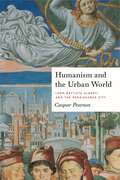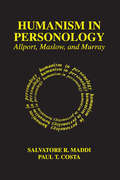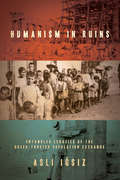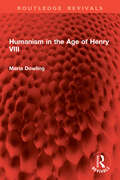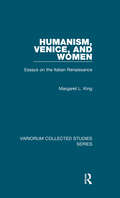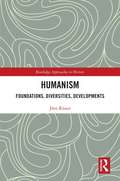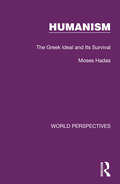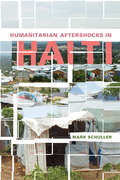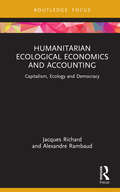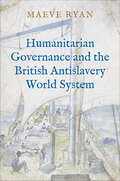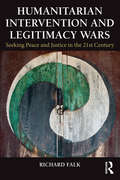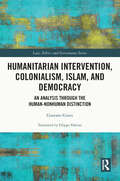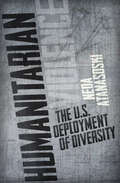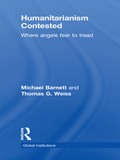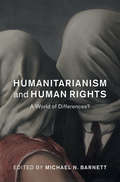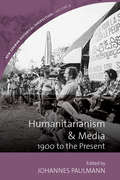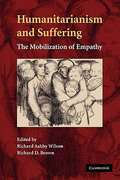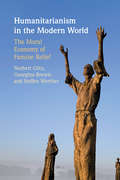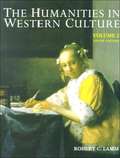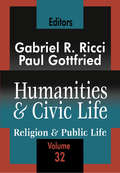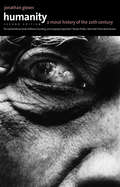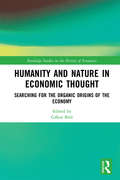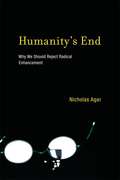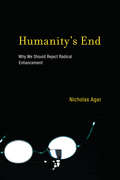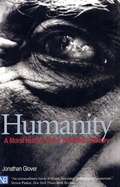- Table View
- List View
Humanism and the Urban World: Leon Battista Alberti and the Renaissance City
by Caspar PearsonIn Humanism and the Urban World, Caspar Pearson offers a profoundly revisionist account of Leon Battista Alberti’s approach to the urban environment as exemplified in the extensive theoretical treatise De re aedificatoria (On the Art of Building in Ten Books), brought mostly to completion in the 1450s, as well as in his larger body of written work. Past scholars have generally characterized the Italian Renaissance architect and theorist as an enthusiast of the city who envisioned it as a rational, Renaissance ideal. Pearson argues, however, that Alberti’s approach to urbanism was far more complex—that he was even “essentially hostile” to the city at times. Rather than proposing the “ideal” city, Pearson maintains, Alberti presented a variety of possible cities, each one different from another. This book explores the ways in which Alberti sought to remedy urban problems, tracing key themes that manifest in De re aedificatoria. Chapters address Alberti’s consideration of the city’s possible destruction and the city’s capacity to provide order despite its intrinsic instability; his assessment of a variety of political solutions to that instability; his affinity for the countryside and discussions of the virtues of the active versus the contemplative life; and his theories of aesthetics and beauty, in particular the belief that beauty may affect the soul of an enemy and thus preserve buildings from attack.
Humanism in Personology: Allport, Maslow, and Murray
by Paul CostaThrough analysis of the lives and theories of the three major exponents of humanism, Allport, Maslow, and Murray, the authors have marshaled some compelling arguments for an alternative to the extreme behaviorism of Skinner and the logical positivism of Freud. This work is a concise, clear synthesis of both broad theoretical positions and specifi c concepts that underlie humanistic psychology.
Humanism in Ruins: Entangled Legacies of the Greek-Turkish Population Exchange
by Aslı IğsızThe 1923 Greek-Turkish population exchange forcibly relocated one and a half million people: Muslims in Greece were resettled in Turkey, and Greek Orthodox Christians in Turkey were moved to Greece. This landmark event set a legal precedent for population management on the basis of religious or ethnic difference. Similar segregative policies—such as creating walls, partitions, and apartheids—have followed in its wake. Strikingly, the exchange was purportedly enacted as a means to achieve peace. Humanism in Ruins maps the links between liberal discourses on peace and the legacies of this forced migration. Aslı Iğsız weaves together past and present, making visible the effects in Turkey across the ensuing century, of the 1923 exchange. Liberal humanism has responded to segregative policies by calling for coexistence and the acceptance of cultural diversity. Yet, as Iğsız makes clear, liberal humanism itself, with its ahistorical emphasis on a shared humanity, fails to confront an underlying racialized logic. This far-reaching and multilayered cultural history investigates what it means to be human—historically, socially, and politically. It delivers an urgent message about the politics of difference at a time when the reincarnation of fascism in different parts of the world invites citizens to participate in perpetuating a racialized and unequal world.
Humanism in the Age of Henry VIII (Routledge Revivals)
by Maria DowlingFirst published in 1986, Humanism in the Age of Henry VIII is concerned with the flourishing humanism outside the religious and political spheres in many different fields and its intellectual and cultural impact on the schools and universities and in the realm of private study, paying particular attention to English contacts with European humanists. It is notorious that the renaissance reached England comparatively late but in the early sixteenth century the new learning was enthusiastically welcomed by the young Henry VIII and Katherine of Aragon.During Henry's long reign both the religious emphasis of humanism and the King’s needs changed and this book investigates the relation of humanists to religious policy. The qualities and accomplishments of the renaissance gentleman are also considered, as is the influence of the new learning on the studies and status of women. This is an important historical reference work for scholars and researchers of British history.
Humanism, Venice, and Women: Essays on the Italian Renaissance (Variorum Collected Studies #802)
by Margaret L. KingOriginally published between 1975 and 2003, the essays included in Humanism, Venice, and Women reflect Margaret L. King's distinct but interlocking scholarly interests: humanism and Venice; women and humanism; and women of the Italian Renaissance. The first part focuses on defining the key characteristics of Venetian as opposed to other Italian humanisms, with an analysis of Gramscian theory about the historical role of intellectuals as an aid to understanding humanism in Venice, followed by essays on three Venetian humanists who wrote about family relationships (or the need to avoid them). The third section introduces the major Renaissance women humanists and analyzes the relation of their work to that of male humanists, along with an essay on Renaissance mothers of sons, in Italy and beyond. Crossing boundaries of region and gender, and the subdisciplines of intellectual and social history, these essays are provocative in themselves while demonstrating how shifting historiographical contexts encourage scholars to view the historical record in new and fruitful ways.
Humanism: Foundations, Diversities, Developments (Routledge Approaches to History)
by Jörn RüsenThe book describes humanism in a systematic and historical perspective. It analyzes its manifestation and function in cultural studies and its role in the present. Within the book, special attention is given to the intention of contemporary humanism to overcome ethno-centric elements in the cultural orientation of contemporary living conditions and to develop humane dimensions of this orientation. This is linked to a fundamental critique of the current post-human self-understanding of the humanities. Furthermore, the intercultural aspect in the understanding of humanism is emphasized; for non-Western cultures also have their own humanistic traditions. Two further aspects are also addressed: the Holocaust as the most radical challenge to humanistic thinking and the relationship of humanism to nature. Sitting at the intersection of history and philosophy, the book is perfect for those exploring humanism from an historical perspective.
Humanism: The Greek Ideal and Its Survival (World Perspectives #6)
by Moses HadasOriginally published in the UK in 1961 this was an unconventional book when first published but a powerful interpretation of Greek individualism. The author examines the influence of the Greeks on European philosophy, religion, literature, art and architecture and challenges many commonly held assumptions: ‘Those items in the Greek legacy which are most easily recognizable as such are in fact the least important.’
Humanitarian Aftershocks in Haiti
by Mark SchullerThe 2010 earthquake in Haiti was one of the deadliest disasters in modern history, sparking an international aid response--with pledges and donations of $16 billion--that was exceedingly generous. But now, five years later, that generous aid has clearly failed. In Humanitarian Aftershocks in Haiti, anthropologist Mark Schuller captures the voices of those involved in the earthquake aid response, and they paint a sharp, unflattering view of the humanitarian enterprise. Schuller led an independent study of eight displaced-persons camps in Haiti, compiling more than 150 interviews ranging from Haitian front-line workers and camp directors to foreign humanitarians and many displaced Haitian people. The result is an insightful account of why the multi-billion-dollar aid response not only did little to help but also did much harm, triggering a range of unintended consequences, rupturing Haitian social and cultural institutions, and actually increasing violence, especially against women. The book shows how Haitian people were removed from any real decision-making, replaced by a top-down, NGO-dominated system of humanitarian aid, led by an army of often young, inexperienced foreign workers. Ignorant of Haitian culture, these aid workers unwittingly enacted policies that triggered a range of negative results. Haitian interviewees also note that the NGOs "planted the flag," and often tended to "just do something," always with an eye to the "photo op" (in no small part due to the competition over funding). Worse yet, they blindly supported the eviction of displaced people from the camps, forcing earthquake victims to relocate in vast shantytowns that were hotbeds of violence. Humanitarian Aftershocks in Haiti concludes with suggestions to help improve humanitarian aid in the future, perhaps most notably, that aid workers listen to--and respect the culture of--the victims of catastrophe.
Humanitarian Ecological Economics and Accounting: Capitalism, Ecology and Democracy (Economics and Humanities)
by Jacques Richard Alexandre RambaudThe strict conversation of financial capital allows accountants to preserve capitalism in its current form. Thus, building a more humane economy will require a new accounting model. Humanitarian Ecological Economics and Accounting: Capitalism, Ecology and Democracy argues for the adoption of a CARE model: comprehensive accounting in respect of ecology. This new model will take the traditional weapons of capitalist accounting and turn them against capitalism, with a goal to protect and conserve human and natural capital within the framework of a democratic society. The CARE model has been conceived as the potential basis of a new type of market economy and of a new type of governance of firms and nations. Additionally, this allows for a new conception of capital, cost and profit that helps with moves towards a society of the commons. The first part of the book explores the reconstruction of accounting and economics from the ground up, outlining the theoretical basis for the model. The second part of the book explores the transformation of the governance of firms and nations. Finally, an additional section is dedicated to the conception of a new model of national accounting. This book will be of significant interest to readers of ecological economics, critical accounting and heterodox economics.
Humanitarian Governance and the British Antislavery World System
by Maeve RyanHow the suppression of the slave trade and the &“disposal&” of liberated Africans shaped the emergence of modern humanitarianism Between 1808 and 1867, the British navy&’s Atlantic squadrons seized nearly two thousand slave ships, &“re‑capturing&” almost two hundred thousand enslaved people and resettling them as liberated Africans across sites from Sierra Leone and Cape Colony to the West Indies, Brazil, Cuba, and beyond. In this wide-ranging study, Maeve Ryan explores the set of imperial experiments that took shape as British authorities sought to order and instrumentalise the liberated Africans, and examines the dual discourses of compassion and control that evolved around a people expected to repay the debt of their salvation. Ryan traces the ideas that shaped &“disposal&” policies towards liberated Africans, and the forms of resistance and accommodation that characterized their responses. This book demonstrates the impact of interventionist experiments on the lives of the liberated people, on the evolution of a British antislavery &“world system,&” and on the emergence of modern understandings of refuge, asylum, and humanitarian governance.
Humanitarian Intervention and Legitimacy Wars: Seeking Peace and Justice in the 21st Century
by Richard FalkIn the aftermath of the Cold War there has been a dramatic shift in thinking about the maintenance of peace and security on a global level. This shift is away from a preoccupation with how to prevent major wars between sovereign states to a preoccupation about non-state transnational warfare and violence and strife within states in a world order that continues to be juridically and politically delimited by spatial ideas of national sovereignty and national independence as signified by international boundaries. In this book, Richard Falk draws upon these changes to examine the ethics and politics of humanitarian intervention in the 21st Century. As well as analysing the theoretical and conceptual basis of the responsibility to protect, the book also contains a number of case studies looking at Iraq, Afghanistan, Kosovo and Syria. The final section explores when humanitarian intervention can succeed and the changing nature of international political legitimacy in countries such as India, Tibet, South Africa and Palestine. This book will be of interest to students of International Relations theory, Peace Studies and Global Politics.
Humanitarian Intervention, Colonialism, Islam and Democracy: An Analysis through the Human-Nonhuman Distinction (Law, Ethics and Governance)
by Gustavo GozziThis book offers a critical analysis of the European colonial heritage in the Arab countries and highlights the way this legacy is still with us today, informing the current state of relations between Europe and the formerly colonized states. The work analyses the fraught relationship between the Western powers and the Arab countries that have been subject to their colonial rule. It does so by looking at this relationship from two vantage points. On the one hand is that of humanitarian intervention—a paradigm under which colonial rule coexisted alongside “humanitarian” policies pursued on the dual assumption that the colonized were “barbarous” peoples who wanted to be civilized and that the West could lay a claim of superiority over an inferior humanity. On the other hand is the Arab view, from which the humanitarian paradigm does not hold up, and which accordingly offers its own insights into the processes through which the Arab countries have sought to wrest themselves from colonial rule. In unpacking this analysis the book traces a history of international and colonial law, to this end also using the tools offered by the history of political thought. The book will be of interest to students, academics, and researchers working in legal history, international law, international relations, the history of political thought, and colonial studies.
Humanitarian Violence: The U.S. Deployment of Diversity (Difference Incorporated)
by Neda AtanasoskiWhen is a war not a war? When it is undertaken in the name of democracy, against the forces of racism, sexism, and religious and political persecution? This is the new world of warfare that Neda Atanasoski observes in Humanitarian Violence, different in name from the old imperialism but not so different in kind. In particular, she considers U.S. militarism—humanitarian militarism—during the Vietnam War, the Soviet-Afghan War, and the 1990s wars of secession in the former Yugoslavia.What this book brings to light—through novels, travel narratives, photojournalism, films, news media, and political rhetoric—is in fact a system of postsocialist imperialism based on humanitarian ethics. In the fiction of the United States as a multicultural haven, which morally underwrites the nation&’s equally brutal waging of war and making of peace, parts of the world are subject to the violence of U.S. power because they are portrayed to be homogeneous and racially, religiously, and sexually intolerant—and thus permanently in need of reform. The entangled notions of humanity and atrocity that follow from such mediations of war and crisis have refigured conceptions of racial and religious freedom in the post–Cold War era. The resulting cultural narratives, Atanasoski suggests, tend to racialize ideological differences—whereas previous forms of imperialism racialized bodies. In place of the European racial imperialism, U.S. settler colonialism, and pre–civil rights racial constructions that associated racial difference with a devaluing of nonwhite bodies, Humanitarian Violence identifies an emerging discourse of race that focuses on ideological and cultural differences and makes postsocialist and Islamic nations the potential targets of U.S. disciplining violence.
Humanitarianism Contested: Where Angels Fear to Tread
by Michael Barnett Thomas G. WeissThis book provides a succinct but sophisticated understanding of humanitarianism and insight into the on-going dilemmas and tensions that have accompanied it since its origins in the early nineteenth century. Combining theoretical and historical exposition with a broad range of contemporary case studies, the book: provides a brief survey of the history of humanitarianism, beginning with the anti-slavery movement in the early nineteenth century and continuing to today’s challenge of post-conflict reconstruction and saving failed states explains the evolution of humanitarianism. Not only has it evolved over the decades, but since the end of the Cold War, humanitarianism has exploded in scope, scale, and significance presents an overview of the contemporary humanitarian sector, including briefly who the key actors are, how they are funded and what they do with their money analyses the ethical dilemmas confronted by humanitarian organization, not only in the abstract but also, and most importantly, in real situations and when lives are at stake examines how humanitarianism poses fundamental ethical questions regarding the kind of world we want to live in, what kind of world is possible, and how we might get there. An accessible and engaging work by two of the leading scholars in the field, Humanitarianism Contested is essential reading for all those concerned with the future of human rights and international relations.
Humanitarianism and Human Rights: A World of Differences? (Human Rights in History)
by Michael N. BarnettThis book explores the fluctuating relationship between human rights and humanitarianism. For most of their lives, human rights and humanitarianism have been distant cousins. Humanitarianism focused on situations in faraway places dealing with large-scale loss of life that demanded urgent attention whilst human rights advanced the cause of individual liberty and equality at home. However, the twentieth century saw the two coming much more directly into dialogue, particularly following the end of the Cold War, as both began working in war zones and post-conflict situations. Leading scholars probe how the shifting meanings of human rights and humanitarianism converge and diverge from a variety of disciplinary perspectives ranging from philosophical inquiries that consider whether and how differences are constructed at the level of ethics, obligations, and duties, to historical inquiries that attempt to locate core differences within and between historical periods, and to practice-oriented perspectives that suggest how differences are created and recreated in response to concrete problems and through different kinds of organised activities with different goals and meanings.
Humanitarianism and Media: 1900 to the Present (New German Historical Perspectives #9)
by Johannes PaulmannFrom Christian missionary publications to the media strategies employed by today’s NGOs, this interdisciplinary collection explores the entangled histories of humanitarianism and media. It traces the emergence of humanitarian imagery in the West and investigates how the meanings of suffering and aid have been constructed in a period of evolving mass communication, demonstrating the extent to which many seemingly new phenomena in fact have long historical legacies. Ultimately, the critical histories collected here help to challenge existing asymmetries and help those who advocate a new cosmopolitan consciousness recognizing the dignity and rights of others.
Humanitarianism and Suffering: The Mobilization of Empathy
by Richard Ashby Wilson Richard D. BrownHumanitarian sentiments have motivated a variety of manifestations of pity, from nineteenth-century movements to end slavery to the creation of modern international humanitarian law. While humanitarianism is clearly political, Humanitarianism and Suffering addresses the ways in which it is also an ethos embedded in civil society, one that drives secular and religious social and cultural movements, not just legal and political institutions. As an ethos, humanitarianism has a strong narrative and representational dimension that can generate humanitarian constituencies for particular causes. The emotional nature of compassion is closely linked to visual and literary images of suffering and innocence. Essays in the volume analyze the character, form, and voice of private or public narratives themselves and explain how and why some narratives of suffering energize political movements of solidarity, whereas others do not. Humanitarianism and Suffering explores when, how, and why humanitarian movements become widespread popular movements. It shows how popular sentiments move political and social elites to action and, conversely, how national elites appropriate humanitarian ideals for more instrumental ends.
Humanitarianism in the Modern World: The Moral Economy of Famine Relief
by Georgina Brewis Norbert Götz Steffen WertherThis is an innovative new history of famine relief and humanitarianism. The authors apply a moral economy approach to shed new light on the forces and ideas that motivated and shaped humanitarian aid during the Great Irish Famine, the famine of 1921-1922 in Soviet Russia and the Ukraine, and the 1980s Ethiopian famine. They place these episodes within a distinctive periodisation of humanitarianism which emphasises the correlations with politico-economic regimes: the time of elitist laissez-faire liberalism in the nineteenth century as one of ad hoc humanitarianism; that of Taylorism and mass society from c.1900-1970 as one of organised humanitarianism; and the blend of individualised post-material lifestyles and neoliberal public management since 1970 as one of expressive humanitarianism. The book as a whole shifts the focus of the history of humanitarianism from the imperatives of crisis management to the pragmatic mechanisms of fundraising, relief efforts on the ground, and finance.
Humanities In Western Culture: Volume 2
by Robert LammThese two beautifully illustrated chronological volumes introduce your students to the arts of literature, sculpture, painting, architecture, music, photography, and film, and the philosophical ideas permeating ancient through modern civilizations. Packaged with supplemental Student Study Guides and audio cassettes to accompany each volume, this set provides an excellent all-in-one introduction to the humanities.
Humanities and Civic Life: Volume 32 (Religion And Public Life Ser. #Vol. 32)
by Paul Edward GottfriedThis volume in Religion and Public Life, a series on religion and public affairs, provides a wide-ranging forum for differing views on religious and ethical considerations. The contributions address the decline of social capital-those patterns of behavior which are conducive to self-governance and the spirit of self-reliance-and its relation to the demise of the civic-humanist tradition in American education. The unifying theme, is that classical studies do not merely result in individual mastery over a particular technique or body of knowledge, but also link the individual to the polity and even to the whole of the cosmic order. At the same time, American republicanism, in its exaltation of the common man from the Jeffersonian agrarian soldier to the apotheosis of Lincoln tempers the classical ideal into something less exalted, if more democratic. The effects on the contemporary state of the liberal arts curriculum are demonstrated in articles critical of the market-model university. Two essays explore the historical and philosophical significance of the discipline of rhetoric, that has suffered under the hegemony of rationalistic philosophy. A concluding contribution, invokes Giambattista Vico as an eloquent defender of the humanities. Humanities and Civic Life includes: "Rome, Florence, and Philadelphia: Using the History of the Humanities to Renew Our Civic Life" by Robert E. Proctor; "The Dark Fields of the Republic: The Persistence of Republican Thought in American History" by David Brown; "Unleashing the Humanities" by Robert Weisbuch; "Liberal Arts: Listening to Faculty" by Dennis O'Brien; "Historical Consciousness in Antiquity" by Paul Gottfried; "Taking the Measure of Relativism and the Civic Virtue of Rhetoric" by Gabriel R. Ricci; "The River: A Vichian Dialogue on Humanistic Education" by Randall E. Auxier.
Humanity
by Jonathan GloverThis fascinating and profound book is about the psychology that made possible Hiroshima, the Nazi genocide, the Gulag, the Chinese Cultural Revolution, Pol Pot's Cambodia, Rwanda, Bosnia and many other atrocities. The author reveals common patterns - how the distance and fragmented responsibility of technological warfare gave rise to Hiroshima; how the tribalism resulted in mutual fear and hatred in Rwanda and the former Yugoslavia; how the systems of belief made atrocities possible in Stalin's Russia, in Mao's China and in Cambodia; and how the powerful combination of tribalism and belief enabled people to do otherwise unimaginable things in Nazi Germany. The common patterns suggest weak points in our psychology. The resulting picture is used as a guide for the ethics we should create if we hope to overcome them.
Humanity and Nature in Economic Thought: Searching for the Organic Origins of the Economy (Routledge Studies in the History of Economics)
by Gábor BíróHumanity and Nature in Economic Thought: Searching for the Organic Origins of the Economy argues that organic elements seen as incompatible with rational homo economicus have been left out of, or downplayed in, mainstream histories of economic thought. The chapters show that organic aspects (that is, aspects related to sensitive, cognitive or social human qualities) were present in the economic ideas of a wide range of important thinkers including Hume, Smith, Malthus, Mill, Marshall, Keynes, Hayek and the Polanyi brothers. Moreover, the contributors to this thought-provoking volume reveal in turn that these aspects were crucial to how these key figures thought about the economy. This stimulating collection of essays will be of interest to advanced students and scholars of the history of economic thought, economic philosophy, heterodox economics, moral philosophy and intellectual history.
Humanity's End
by Nicholas AgarProposals to make us smarter than the greatest geniuses or to add thousands of years to our life spans seem fit only for the spam folder or trash can. And yet this is what contemporary advocates of radical enhancement offer in all seriousness. They present a variety of technologies and therapies that will expand our capacities far beyond what is currently possible for human beings. In Humanity's End, Nicholas Agar argues against radical enhancement, describing its destructive consequences. Agar examines the proposals of four prominent radical enhancers: Ray Kurzweil, who argues that technology will enable our escape from human biology; Aubrey de Grey, who calls for anti-aging therapies that will achieve "longevity escape velocity"; Nick Bostrom, who defends the morality and rationality of enhancement; and James Hughes, who envisions a harmonious democracy of the enhanced and the unenhanced. Agar argues that the outcomes of radical enhancement could be darker than the rosy futures described by these thinkers. The most dramatic means of enhancing our cognitive powers could in fact kill us; the radical extension of our life span could eliminate experiences of great value from our lives; and a situation in which some humans are radically enhanced and others are not could lead to tyranny of posthumans over humans.
Humanity's End: Why We Should Reject Radical Enhancement (Life and Mind: Philosophical Issues in Biology and Psychology)
by Nicholas AgarAn argument that achieving millennial life spans or monumental intellects will destroy values that give meaning to human lives.Proposals to make us smarter than the greatest geniuses or to add thousands of years to our life spans seem fit only for the spam folder or trash can. And yet this is what contemporary advocates of radical enhancement offer in all seriousness. They present a variety of technologies and therapies that will expand our capacities far beyond what is currently possible for human beings. In Humanity's End, Nicholas Agar argues against radical enhancement, describing its destructive consequences. Agar examines the proposals of four prominent radical enhancers: Ray Kurzweil, who argues that technology will enable our escape from human biology; Aubrey de Grey, who calls for anti-aging therapies that will achieve “longevity escape velocity”; Nick Bostrom, who defends the morality and rationality of enhancement; and James Hughes, who envisions a harmonious democracy of the enhanced and the unenhanced. Agar argues that the outcomes of radical enhancement could be darker than the rosy futures described by these thinkers. The most dramatic means of enhancing our cognitive powers could in fact kill us; the radical extension of our life span could eliminate experiences of great value from our lives; and a situation in which some humans are radically enhanced and others are not could lead to tyranny of posthumans over humans.
Humanity: A Moral History of the Twentieth Century
by Jonathan GloverThis important book confronts the brutal history of the 20th century to unravel the psychological mystery of why so many atrocities occurred--the Holocaust, Hiroshima, the Gulag, Cambodia, Yugoslavia, Rwanda, and others--and how we can prevent their re-occurrence.
